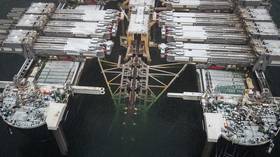Oil giant Saudi Aramco profits crash amid coronavirus-driven energy market rout
Falling crude prices amid an unprecedented global demand slump have taken a big bite out of Saudi Aramco’s net income in the first three months of this year, according to the financial results released by the oil giant.
In a release published Tuesday, Saudi Aramco reported that its net income plunged to 62.5 billion riyals ($16.6 billion) in the first quarter of 2020 from 83.3 billion riyals ($22 billion) a year earlier. The results are below analysts’ estimates, who expected the company to report a $17.8 billion profit.
Aramco said the drop was mainly caused by lower crude oil prices, “as well as declining refining and chemicals margins and inventory re-measurement losses.”
Also on rt.com Saudi Arabia to triple VAT as Covid-19 & low oil cripple state finances“The Covid-19 crisis is unlike anything the world has experienced in recent history and we are adapting to a highly complex and rapidly changing business environment,” Aramco President and CEO Amin Nasser said.
Less than 24-hours before the Saudi oil giant announced the disappointing earnings, Riyadh ordered the company to deepen output cuts. On Monday, the kingdom’s Ministry of Energy said it was looking into slashing production starting this month and it will additionally reduce production by one million barrels per day (bpd) starting in June.
The fresh cuts come in addition to the kingdom’s commitments under a historic oil deal inked by the members of the Organization of the Petroleum Exporting Countries (OPEC) and allied oil producers in April. The agreement, which came into force this month, slashed global oil production by 9.7 million bpd.
Also on rt.com China boosts oil imports from Russia, while slashing purchases from Saudi ArabiaThe Covid-19 outbreak has added pressure on the energy market as it has almost halted travel around the globe. However, crude prices were on a wild ride even before border closures. The first dramatic crash came in March, after the previous OPEC+ pact fell apart due to disagreement between Russia and Saudi Arabia.
While no deal was in place, Riyadh opened the oil taps in April and offered discounts to buyers of its crude, worsening the situation in an already oversupplied market. The supply glut triggered concerns that the world was lacking space to store oil, leading to another collapse in prices and driving US oil futures into negative territory for the first time ever.
For more stories on economy & finance visit RT's business section












